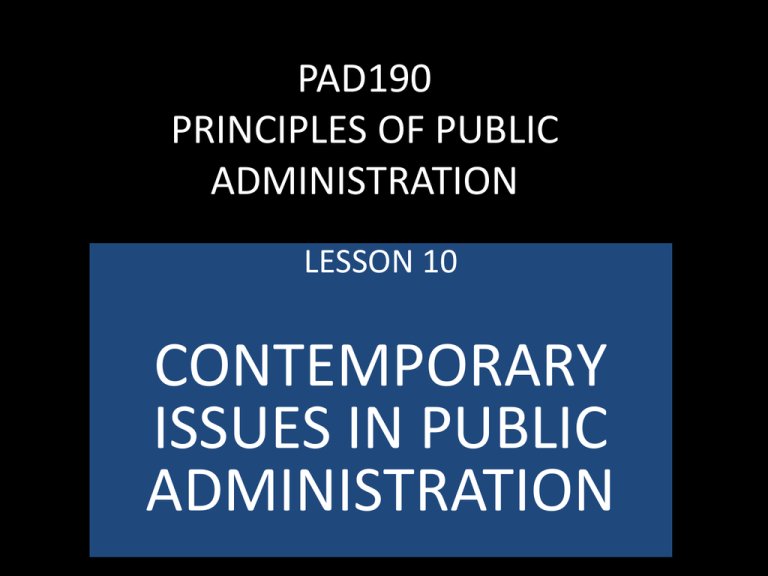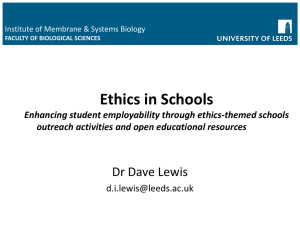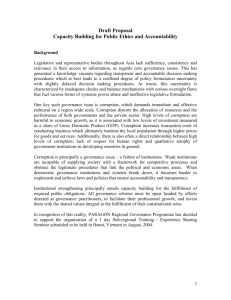LESSON 10 PAD190
advertisement

PAD190 PRINCIPLES OF PUBLIC ADMINISTRATION LESSON 10 CONTEMPORARY ISSUES IN PUBLIC ADMINISTRATION THE OBJECTIVES OF THIS LESSON After attended this lecture student should be able to:1. Describe the contemporary issues and challenges of public administration. 2. Describe the concept of ethic and integrity in public administration. 3. Describe the strategies to be adopted in enhancing ethics and integrity of public administration. 4. Explain the importance of PIN in Malaysia INTRODUCTION Malaysia has been a successful developing country and is forging ahead to become a developed nation in its own mould. In order to be more successful, our nation has to be managed effectively and its weaknesses and shortcomings have to be overcome. A major challenge it has to address in this endeavour is the strengthening of ethics and Integrity. Tun Abdullah Ahmad Badawi (Ex-Prime Minister THE FUNDAMANTEL CHANGE IN PUBLIC ADMINISTRATION. • PUBLIC ADMINISTRATION TO BE MORE COMPETITIVE • PUBLIC ADMINISTRATION TO BE MORE PROFESSIONAL • PUBLIC ADMINISTRATION TO BE MORE ACCOUNTABLE TO THE PUBLIC • PUBLIC ADMINISTRATION TO BE MORE ETHICALS CONCERNS PUBLIC ADMINISTRATION CONTEMPORARY ISSUES AND CHALLENGES • • • • • Corruption and bribery among public servants Misused of public fund Malpractices in administration activities Inefficiency in delivering services Lack of initiative, motivation, commitment and performance among public employees • Lack of accountability among public servants THE IMPLICATIONS OF THESE ISSUES • Raise ethical and integrity concerns of public administration • Reduce Public trust and confidence towards the government • Effect public administration services delivery and performance STARTIGIES FOR IMPROVING AND ENHANCING PUBLIC ADMINISTRATION • Enhancing ethics and integrity • Enhancing public administration accountability • The application of best technology to enhancing service delivery • Training and development • Organizational Restructuring • Reinventing public services • Reorienting public perceptions ENHANCING PUBLIC ADMINISTRATION ETHICS AND INTEGRITY • ETHICS – Moral values or codes which concerns with goodness or badness of character or disposition. • INTEGRITY – having abilities to achieve the goals in most ethical and efficient manner By having these two values public administration able to apply good practice and fulfill the public high expectation on public service delivery NATIONAL INTEGRITY PLAN (PIN) The overall objective is to establish a fully moral and ethical society whose citizens are strong in religious and spiritual values and imbued with the highest ethical standards NIP TARGETS 2008 • Effectively reduce corruption, malpractices and abuse of power; • Increase efficiency of the public delivery system and overcome bureaucratic red tape; • Enhance corporate governance and business ethics; • Strengthen the family institution; and • Improve the quality of life and people's wellbeing. PUBLIC ACCOUNTABILITY • The obligation of public administration and agencies (who are entrusted with public resources ) to be answerable for fiscal and social responsibilities, to those who have assigned such responsibilities to them. • Enhancing public administration accountability means public administration must operate based on legal, administrative, political and constitutional framework. • Any organizational misconduct should be avoided. APPLICATION OF BEST TECHNOLOGY – e-government • E-government - refers to the use by government agencies of information technologies (such as Wide Area Networks, the Internet, and mobile computing) that have the ability to transform relations with citizens, businesses, and other arms of government. • These technologies can serve a variety of different ends: better delivery of government services to citizens, improved interactions with business and industry and more efficient government management. • The resulting benefits can be less corruption, increased transparency, greater convenience, revenue growth, and/or cost reductions. REINVENTING PUBLIC SERVICE • LIBERALIZATION/PRIVATIZATION - the transfer of the public sector activities and functions to the private sector. • DOWNSIZING - Reducing the total number of employees at an organization through terminations, retirements, or spinoffs. • QUALITY MANAGEMENT - All management activities and functions involved in determination of quality policies and its implementation through means such as quality planning and quality assurance and quality control. • KEY PEFORMANCE INDICATORS (KPIs) - help an organization define and measure progress toward organizational goals. • THE NATIONAL KEY RESULT AREAS (NKRA) – Government Transformation Program (GTP) roadmap in implementing the policies based on six major areas for ensuring performance. • NEW ECONOMIC MODEL (MEB) - outline how Malaysia can further improve its economic situation from the high middle income level now to the high income level. THE SIX NKRAs Reducing crime Fighting corruption Improving student outcomes Raising living standards of lowincome household Improving rural basic infrastructure Improving urban public transport GOVERNMENT TRANSFORMATION PROGRAMME Transformational Leader Must be Able To Break Down Resistance To Change . Najib Tun Razak INTERNET LINKS • http://www.transformation.gov.my/index.php ?option=com_content&view=article&id=138& Itemid=83&lang=en • http://www.fortner.com.my/Consulting_KPI.ht m • http://www.usm.my/ipptn/fileup/Key%20Perf ormance%20Indicators%20(KPIs).pdf TUTORIAL • Define public administration ethics and integrity. • Describe National Integrity Plan • Describe the strategies adopted by the government to enhance public administration in Malaysia. THAT ALL WISH ALL OF YOU THE BEST AND GOOD LUCK THANK YOU











